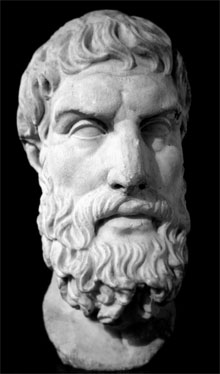
Marble bust of Epicurus. Roman copy of Greek original, 3rd century BC/2nd century BC. On display in the British Museum, London
Epicurus
Epicurus (341 BC – 270 BC) was the most important of the ancient atomists after Democritus. He differed from Democritus in his proposal that atoms in motion in the void were subject to ‘swerves’ (clinamen). In this way he hoped to reconcile the doctrine of free-will with the strict determinism of the early atomists.
Epicurus also wrote on scientific method, urging the primacy of observation and logical deduction over rational speculation. He argued that differing causal explanations of one and the same effect need not be in conflict with one another and could be admitted simultaneously.
Few complete works by Epicurus have survived: they are to found book X of Diogenes Laertius' Lives of Eminent Philosophers. There are, however, numerous fragments and references to his works, including to his 37 volume treatise On Nature. Some papyrus fragments of the latter were preserved by volcanic ash at the Villa of the Papyri, at Herculaneum, following the eruption of Vesuvius.
In addition, other Epicurean writings found at Herculaneum contain important quotations from his other works. Moreover, numerous fragments and testimonies are found throughout ancient Greek and Roman literature, a collection of which can be found in Usener Epicurea.
Epicurus was born in Samos, where he studied philosophy under the neo-Platonist Pamphilus. At the age of 18 he travelled to Athens.
Links
Wikisource. Diogenes Laertius: Lives of the Eminent Philosophers >
Stanford Encyclopedia of Philosophy >
